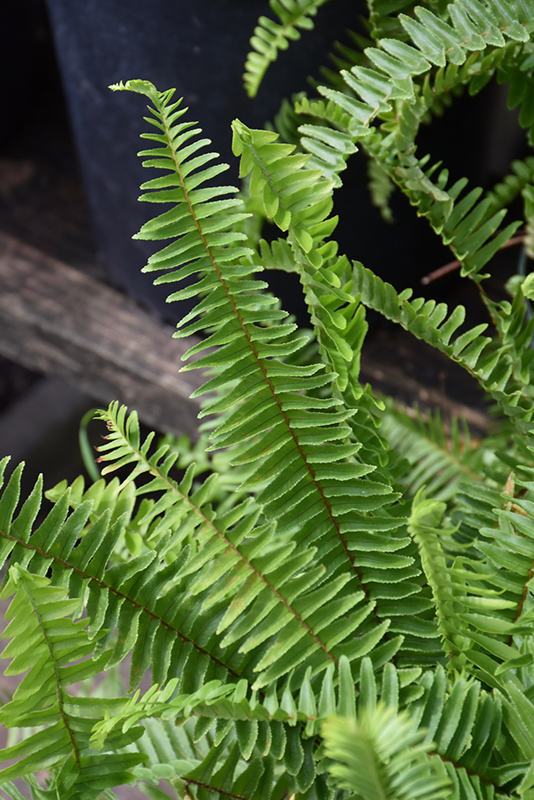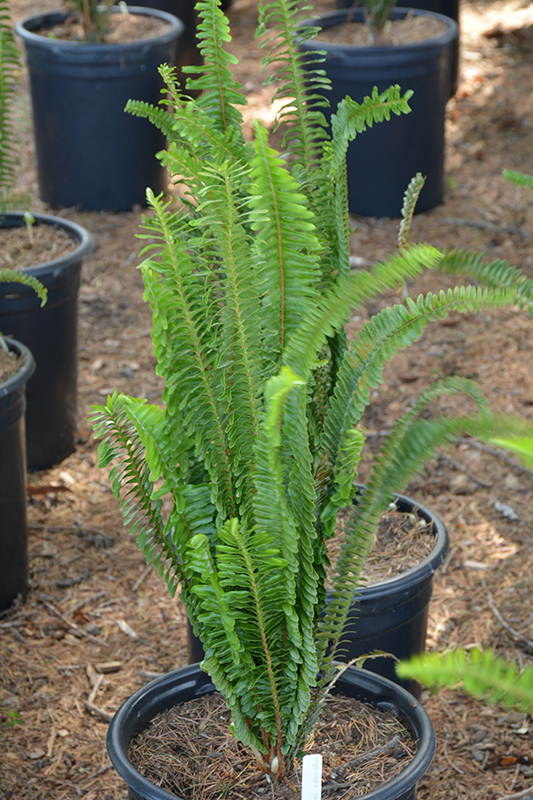Height: 3 feet Spacing: 24 inches
Sunlight:
Hardiness Zone: 9a Other Names: Boston Fern, Tuber Ladder Fern, Fishbone Fern Description: Elegant, finely-toothed, sword-shaped fronds rise from short, hairy leaf stems; an impressive groundcover for a woodland area; great in hanging baskets or containers, for indoors or out Ornamental Features Sword Fern's attractive glossy ferny pinnately compound leaves remain green in color throughout the year on a plant with an arching habit of growth. Landscape Attributes Sword Fern is a dense herbaceous evergreen fern with a shapely form and gracefully arching fronds. Its relatively fine texture sets it apart from other garden plants with less refined foliage. This plant will require occasional maintenance and upkeep, and should not require much pruning, except when necessary, such as to remove dieback. Gardeners should be aware of the following characteristic(s) that may warrant special consideration; Sword Fern is recommended for the following landscape applications; Planting & Growing Sword Fern will grow to be about 3 feet tall at maturity, with a spread of 3 feet. When grown in masses or used as a bedding plant, individual plants should be spaced approximately 24 inches apart. Its foliage tends to remain dense right to the ground, not requiring facer plants in front. It grows at a fast rate, and under ideal conditions can be expected to live for approximately 20 years. As an evegreen perennial, this plant will typically keep its form and foliage year-round. This plant performs well in both full sun and full shade. It does best in average to evenly moist conditions, but will not tolerate standing water. It is not particular as to soil pH, but grows best in rich soils. It is somewhat tolerant of urban pollution. This species is not originally from North America. It can be propagated by division. Sword Fern is a fine choice for the garden, but it is also a good selection for planting in outdoor containers and hanging baskets. Because of its height, it is often used as a 'thriller' in the 'spiller-thriller-filler' container combination; plant it near the center of the pot, surrounded by smaller plants and those that spill over the edges. It is even sizeable enough that it can be grown alone in a suitable container. Note that when growing plants in outdoor containers and baskets, they may require more frequent waterings than they would in the yard or garden.![]()
![]()
![]()
![]()
![]()
![]()
![]()
![]()
![]()
![]()
![]()
![]()
top of page
Louie's Nursery Menifee - Plant Finder
Characteristics
Applications
Features & Attributes
This tool is an online resource representing many of the varieties that we carry over the course of the season, and is intended for informational purposes only. Inventory varies seasonally, so we cannot guarantee that every plant will be in stock at all times - please contact the store directly for current availability. It does not include our entire selection of plants, so be sure to visit our store to see varieties that may not be represented on this list.
bottom of page

